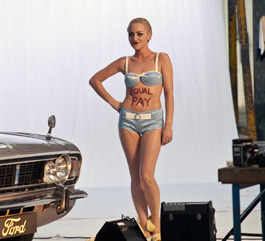home | north bay bohemian index | movies | current reviews | film review

Photograph by Susie Allnutt
LIPSTICK LABOR LEADERS: Jaime Winstone plays a striking worker in this tale of women's rights.
Educating Rita
'Made in Dagenham' revisits '68 women's strike
By Richard von Busack
Nigel Cole's Made in Dagenham is a fictionalized account of the equal-pay-for-equal-work movement in England. With its thin but shiny layer of nostalgia, it makes strike-prone late 1960s England look more colorful than the dreary Northern California weather outside. It's full of robust, sweetly hammy theatrical performances, among which one doesn't include Bob Hoskins' strangely gentle role as a bespectacled labor leader.
It's hard to resist a film suggesting that the struggle for equal rights is a continuation of the David-and-Goliath aspects of England in World War II. In 1968, at the huge Ford Motors plant in Dagenham, London, a group of some 187 female seamstresses work sewing the auto upholstery. It is a job classified as unskilled labor and performed in a leaky and un-air-conditioned garage; since it's a torrid May, the workers throw modesty out and work in their bras, keeping an eye out for men invading the building.
The shop stewards bring their grievance about the shirtless workers to two different union representatives (the featherbedding Kenneth Cranham and the aforementioned Hoskins); the reps give contradictory advice on how to proceed. The upshot is a women's walkout, and the resulting bottleneck paralyzes the Ford plant.
The matter arrives on the desk of the labor minister for Prime Minister Harold Wilson's government, which is already reeling from the number of strikes hitting Britain. The labor minister is a woman, Barbara Castle (Miranda Richardson), who naturally sympathizes with the female workers' claims of deserving equal pay, despite the threats phoned in from Ford headquarters in Detroit (Danny Huston literally telephones in his part as the voice of the highest exec there).
Sally Hawkins soulfully underplays Rita, the worker and mom drafted to speak for the strikers who's surprised to find herself rising to the role. If you like passing on the idea that Daniel Mays is the next Michael Caine, observe how well Mays plays the neglected husband of Rita the crusader, having to make dinner for the kids and burning the frying pans.
Pleasing to the occasional point of bonelessness, this bit of strayed history ends with interviews with the real Dagenham strikers. Cole handles the cast and the subject matter with amiable humor. The period details are seasoning more than the main course, but they are savory: a vintage fashion photography session scored to Traffic's "Paper Sun," for example. And there's a quick demonstration of what made the Ford Cortina popular—the way it gave lovers a little bit of privacy. As a chorus to the action, reporters dressed like secret policemen in fedoras and raincoats scurry around, trying to get a handle on the story; they come up with groan-worthy tags like "Boadiceas in Hairnets" and "Revlon Revolutionaries".
As we can see from the actual news footage of the strike, Cole underestimates the darkness of late '60s England, a tougher yet more idealistic place than we can imagine today. Ultimately, there's no denying the film's point that the accomplishments by the seamstresses in Dagenham are still useful for the rest of the world. When so much of our cinema is cargo-crazed, one wants to defend a movie that quotes an inarguable line by Karl Marx: "Social progress can be measured exactly by the social position of the fair sex."
'Made in Dagenham' opens Jan. 7 at Summerfield Cinemas in Santa Rosa (551 Summerfield Road; 707.522.0719) and runs through Jan. 6 at CinéArts in Marin in Sausalito (101 Caledonia St.; 4145.331.0255).
Send a letter to the editor about this story.
|
|
|
|
|
|